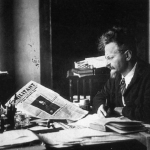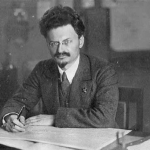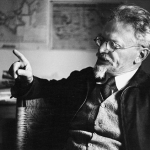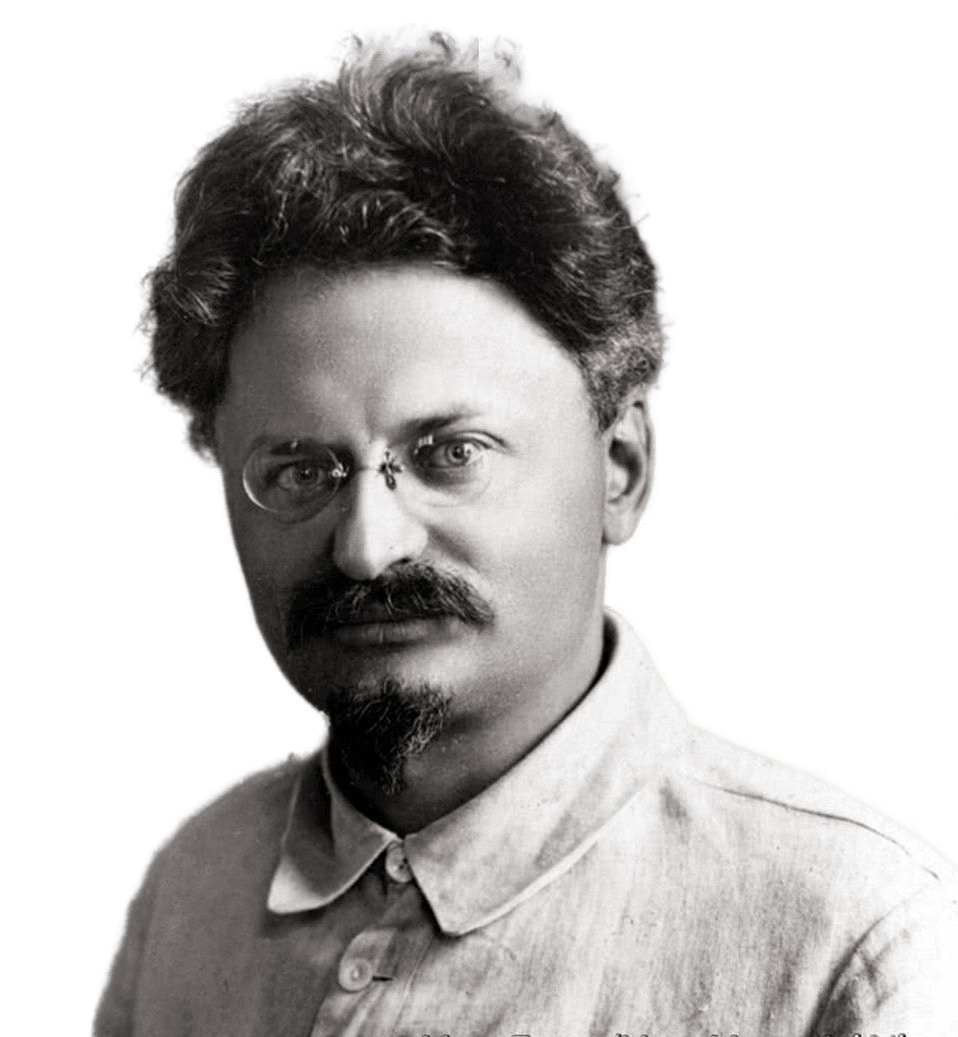
16.12.2022
The news of Lenin’s death on January 21, 1924 caught Trotsky the next day, on his way to a recreational trip to Sukhum, he did not attend the funeral. According to Trotsky himself, he was deceived about the date of the funeral.
One of the questions that the ruling “troika” of Zinoviev-Kamenev-Stalin faced immediately after Lenin’s death was the question of who would take his place in the increasingly decorative post of Chairman of the Sovnarkom. None of the members of the “triumvirate” dared to nominate himself in this capacity, because it would immediately cause complaints from the other two “triumvirs. As a result, the majority of the Politburo, controlled by the Troika, promotes the appointment of the minor and non-threatening Alexei Rykov to the post.
Trotsky is left with nothing but a helpless observation of what is happening. In February 1924 a commission organized by the “troika” recognizes “collapse” in the army and, under the pretext of strengthening its leadership of the masses, introduces many of Trotsky’s opponents, including Kliment Voroshilov, into the army’s top ranks.
During 1924 Trotsky gradually loses control of the army. Tukhachevsky, commander of the Western Front, was transferred to the post of assistant chief of staff of the Red Army in Moscow. Nikolai Muralov was removed from the Moscow Military District, Mikhail Frunze was appointed deputy chairman of the Revolutionary Military Council, and in January, head of the political department, Antonov-Ovseenko, was removed. His replacement, Andrei Bubnov, discovered in the spring of 1924 that the Red Army’s political training program still stubbornly retained the theme “Comrade Trotsky – Leader of the Red Army. Stalin demands that classes on this subject be removed, that the author of the wording be identified and punished, and that it be replaced by “Revvoensovet – Leader of the Red Army.
In May 1924, Trotsky is subjected to real harassment at the 13th Congress of the RCP(b), the first after Lenin’s death. Rykov condemns Trotsky’s “attacks” on the apparatus, equating them with attacks on the Party itself, also rejects Trotsky’s call to “look up to the youth” as the “faithful barometer of the Party. Zinoviev definitively marks his claim to leadership in the ruling triumvirate by delivering a Political Report to the Congress, something only Lenin had done before his illness. The second “triumvirate,” Kamenev, becomes the chairman of this Congress. The Congress sharply condemned “Trotskyism”, demanding that Trotsky renounce factional activity and admit his mistakes. Trotsky, in his response, admitted the correctness of the majority of the Central Committee and the majority of the party, but flatly refused to admit mistakes.
Zinoviev, having delivered his Political Report at two consecutive congresses of the RCP(b), actually claims the role of Lenin’s main successor. Although this is less and less in line with the real balance of power within the ruling “troika” of Zinoviev-Kamenev-Stalin, Stalin prefers to remain in the secondary
role for the time being. Zinoviev’s ambition leads only to Zinoviev himself becoming the main target for supporters of the still dangerous Trotsky, not Stalin. Stalin, on the other hand, prefers to maneuver in case Trotsky, by some miracle, manages to win. At this stage, Stalin positions himself as a “moderate” and even restrains the particularly “bloodthirsty” demands of Zinoviev (for example, in January 1924, Zinoviev demanded the arrest of Trotsky as allegedly preparing a “Bonapartist” military coup).
During 1924 Trotsky gradually loses control over the army, where the “troika” introduces a number of his opponents. Trotsky, losing real power, was left only to appeal to his authority as a figure of the revolution and the Civil War, using his oratorical and publicistic abilities. But until the fall of 1924 Trotsky waits for the right moment.
Trotsky’s passivity leads to the fact that from June 1924 the ruling “troika” begins to fall apart in the absence of a common enemy. On June 17, Stalin, speaking at the course for secretaries of district party committees of the Central Committee of the RCP(b), attacked Zinoviev and Kamenev, “criticizing” the reservation “Russia as Nepeman” instead of “Russia as Nepeman” in Lenin’s quote “Russia as Nepeman will be a socialist Russia” – in the atmosphere of fierce ideological battles prevailing then such a reservation would mean the recognition that Russia is ruled not by communists, but by the Nepeman; The very fact of such a reservation was characterized by Stalin as a “distortion of Leninism. Stalin, carried away, attacked the doctrine of “party dictatorship” proclaimed by Zinoviev at the 12th Congress, calling it “nonsense,” since Marxist theory defined “dictatorship of the proletariat” and not “party dictatorship.” Zinoviev responds by organizing a meeting of the Central Committee, which condemned Stalin’s thesis of “party dictatorship” as “erroneous.
At the same time, Zinoviev and Kamenev increase pressure on Trotsky, demanding his expulsion from the Party, but do not assemble a majority of the Central Committee. At this time Stalin, maneuvering between the two factions, protests against Trotsky’s expulsion from the Party.
Stalin contemptuously characterized Trotsky’s statements about his merits as “Arabian tales” and declared that “talk of Trotsky’s special role is a legend spread by obliging “party goons. In addition to the task of undermining Trotsky’s political authority, he decided to emphasize his own merits in October 1917. For this purpose, Stalin, in his speech “Trotskyism or Leninism?” mentioned the minutes of the meeting of the Central Committee of the RSDLP(b) on October 16, 1917, which reported the creation of the so-called Military-Revolutionary Center (VRC) composed of Dzerzhinsky, Bubnov, Uritsky, Sverdlov and Stalin himself. Stalin presented the case in such a way that this body was in charge of preparing and conducting the uprising. However, no formalized decisions of the VRC are known, and this body almost immediately after its creation became part of the Military-Revolutionary Committee under the Petrograd Soviet, which was actually led by Trotsky.
You may also like:

16.12.2022
Trotsky in the last years of Lenin's life. Beginning of the struggle for power within the RCP(b)

16.12.2022
Lev Trotsky: the most brilliant revolutionary

16.12.2022
Lev Davidovich Trotsky - interesting facts from his biography

16.12.2022
Little Known Facts About Lev Trotsky
